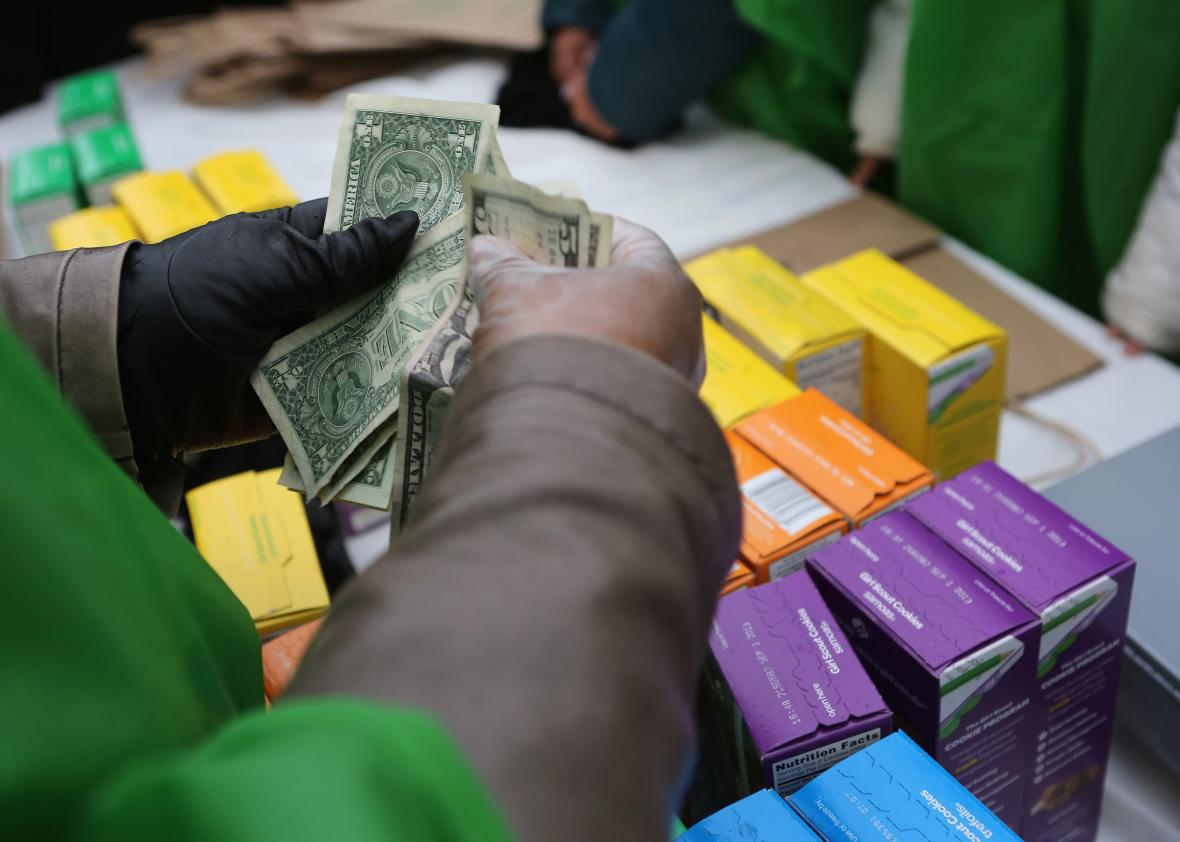In its second year of online cookie sales, Girl Scouts has netted sponsorships from Dell and Visa to help build out its digital sales platform and provide tablets and laptops to scouts who don’t have access to computers. The revamped Digital Cookie program, which allows scouts to make personalized sales websites and process online payments, will include games and quizzes for participants this year. But the organization hasn’t budged on its insistence that scouts initiate every sale—a customer can buy only through a unique link generated by a scout—which limits the program’s capacity for both fundraising and education.
For years, Girl Scouts maintained that its old-school abstention from ecommerce was due to safety concerns, as if knocking on neighborhood doors or sitting outside a subway station were any safer than filing an online form. Now, the organization touts “Internet safety skills” as one of the scout takeaways from the cookie program. Long before Girl Scouts provided a platform for digital marketing and sales, parents and troop leaders engaged in passionate arguments over the program’s guidelines on online advertising. One mother’s 2011 Facebook status about her 6-year-old daughter’s cookie availability spawned a glorious thread of snitching threats and disputes over cookie-hawking semantics. Safety wasn’t the issue here; it was the specter of scouts “cheating” via parental assistance.
Ditto the case of Wild Freeborn, an enterprising 8-year-old scout from North Carolina who used her dad’s technical know-how to build a website and take orders online in 2009. Though Freeborn limited her sales to local customers and delivered the cookies in person, Newsweek reported, some claimed that her methods gave her an unfair leg up over other scouts:
Some families in the community felt threatened by the Freeborn’s unconventional efforts, likely because various prizes (including camp vouchers, stuffed animals and apparel) are given out by local councils to girls who sell a certain amount of boxes. “If you have an individual girl that creates a Web presence, she can suck the opportunity from other girls,” says Matthew Markie, a parent who remains involved in Girl Scouts even though his three daughters are well into their 20s.
In these disputes, safety concerns were a red herring that obscured claims of unfair advantages. But in the current cookie-selling set-up, troops and scouts backed by money already have a leg up. Giving individual scouts prizes with real monetary value seems beside the point of a fundraising campaign—especially since, without allowing scouts to broaden their customer base outside of their families, friends, and immediate geographic networks through true ecommerce, cookie sales can magnify social stratification. Wealthy grandparents and neighbors can buy dozens of boxes from their nearest scouts, while others might struggle to sell just a few units, giving economically privileged scouts and troops a significant head start. Unfettered online sales would allow girls to expand their networks, using their creativity and Internet savvy, not just their social connections, to raise funds for troop activities.
By demanding that scouts initiate every sale “in true Girl Scout style” and limit social media marketing to friends and family, Girl Scouts undermines the two primary purposes of its cookie sales program: fundraising and education in entrepreneurship. Just over 1 percent of the 194 million boxes of Girl Scout cookies sold last year came from online orders, leaving lots of room for financial growth. There’s no reason why education and fundraising should be wholly linked when one is hampering the other. If Girl Scout leadership believes that online sales without a scout’s initial overture would take away from the educational benefits of the program—which could include skills in web development, social-media marketing, and e-commerce platforms—the organization could give scouts other opportunities to learn. The other lessons cookie-selling imparts—dealing with rejection, overcoming stigma, working as a team—could be gleaned from an activity like scout recruiting, since Girl Scout membership and revenue have both flagged in recent years.
Of course, there are people who buy Girl Scout because they want to support the scouts, or because an ambush sales pitch is hard to ignore, and a person-to-person encounter is still the best way to snag these potential customers. The only boxes of Girl Scout cookies I bought last year came from a table of girls, stationed outside a Metro entrance, who were too earnest and adorable to turn down.
But there will always be people who want to buy Girl Scout cookies because they love eating Girl Scout cookies, and direct online sales would give them an easy way to buy. For girls preparing for the 21st-century marketplace, meeting customers where they’re at is a lesson worth learning.
